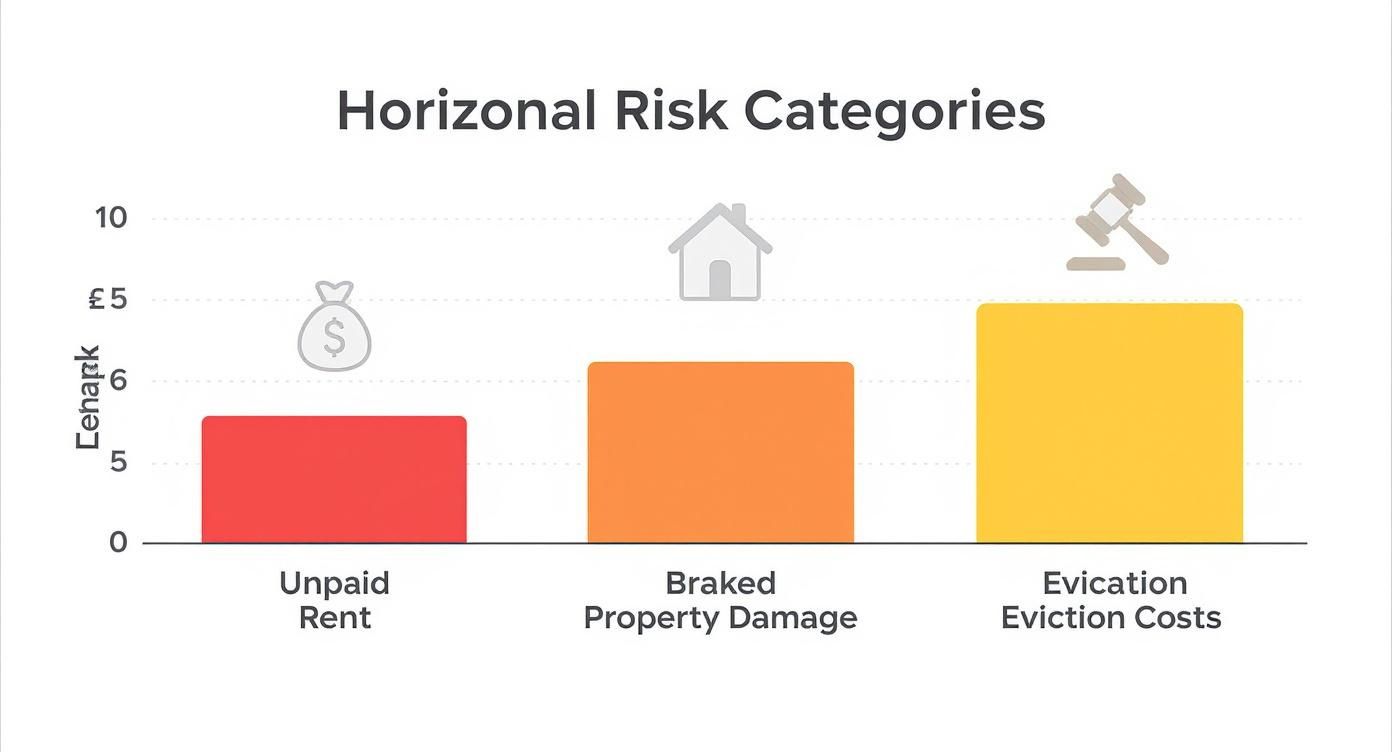For property management companies managing hundreds or thousands of units, tenant screening isn't just an administrative task—it's a critical component of portfolio performance. The right screening service directly impacts revenue by reducing vacancy costs, mitigating risk, and improving operational efficiency. While platforms like RentSpree, TurboTenant, and RentPrep offer solid foundational reports, scaling operations from 100 to 10,000+ units demands a technology-driven approach focused on speed, compliance, and integration.
The choice of screening partner boils down to its ability to support your key performance indicators (KPIs): minimizing Days on Market (DOM), improving lead-to-lease conversion rates, and optimizing cost-per-door.
Navigating Screening Solutions for Enterprise-Scale Operations
Finding a screening partner isn't just a box to check; it’s a strategic decision that protects your assets and stabilizes revenue across a distributed portfolio. With so many platforms available, understanding what separates a basic service from an enterprise-ready solution is key. The goal isn't just to run a background check; it's to find a partner that integrates seamlessly into your leasing workflow, reduces administrative overhead, and provides the data needed for confident, scalable decision-making.
Ultimately, a superior screening process simplifies the challenge of how to find good tenants at scale and provides measurable ROI.

Top Tenant Screening Services for Scalability: At a Glance
To cut through the noise, this comparison highlights top services suited for property management companies focused on efficiency and scale. This table outlines the unique value proposition of each, helping you identify the best fit for your operational framework.
For a deeper look at how integrated leasing platforms drive efficiency, view our full competitive analysis.
Service NameKey FeatureBest ForPricing ModelRentSpreeComprehensive TransUnion reports & income verificationProperty managers wanting a streamlined, applicant-driven application and screening process.Applicant pays ($39.99+)TurboTenantFast turnaround with integrated leasing management toolsMid-size portfolios needing speed and all-in-one leasing features to minimize DOM.Applicant pays ($45-$55)RentPrepCustomizable reporting packages and FCRA-certified screenersLarge portfolios requiring tailored report depths and human-verified data accuracy.Landlord or Applicant pays ($21-$40)SmartMoveDirect-from-source TransUnion data with proprietary ResidentScore®Portfolios prioritizing predictive risk assessment over standard credit scores.Landlord or Applicant pays ($25-$47)
This chart is a starting point for your due diligence. As you evaluate partners, consider critical enterprise factors: API integration capabilities with your core Property Management System (PMS), batch processing for multi-unit buildings, and centralized compliance management across different jurisdictions.
Why Comprehensive Screening is a Core Business Function
For large-scale operators, tenant screening is the single most important risk management tool available. It is the primary defense against revenue loss, asset damage, and costly, brand-damaging evictions. Settling for surface-level reports across a 1,000+ unit portfolio is a direct threat to your net operating income (NOI).
A truly thorough screening process provides a clear financial and behavioral snapshot of an applicant. By analyzing credit history, criminal records, and eviction data, you replace guesswork with a reliable forecast of tenant performance, multiplied across your entire portfolio.
The Financial Stakes: Calculating the Cost of a Bad Placement at Scale
Placing a single problematic tenant can trigger a cascade of financial losses. Across a large portfolio, these costs multiply rapidly. The primary impacts include:
- Lost Revenue: Every day a unit is occupied by a non-paying tenant is a day of lost revenue. For a portfolio with an average rent of $1,800, a single non-paying tenant costs $59 per day. Across 20 such units, that's over $35,000 in lost revenue per month.
- Property Damage: Repairs from neglect or abuse can average thousands of dollars per unit, significantly impacting your maintenance budget and cost-per-door metrics.
- Legal and Eviction Costs: The eviction process is not just an operational bottleneck; it's a significant expense. Nationally, eviction costs range from $2,500 to $3,500 per instance, a figure that can cripple profitability when multiplied across multiple properties.
This financial risk is why the global tenant screening market was valued at USD 3.67 billion in 2023 and is projected to reach USD 7.10 billion by 2032. This growth underscores how essential these services are for protecting large-scale investments. You can see the full research on the tenant screening market's expansion.
Decoding the Screening Report for Portfolio Management
A comprehensive report provides the insights needed for confident, scalable decisions. While formats vary, the core components offer a standardized view of the applicant, crucial for maintaining consistent criteria across markets.
A great screening report tells a story. It reveals patterns of financial responsibility, respect for previous properties, and overall stability—all key indicators of a reliable tenant.
Essential data points include credit scores, verified income, and rental history. A critical component of this process is fraud detection, particularly verifying financial documents. Operations teams should be trained on how to spot fake bank statements to safeguard against misrepresentation.
For property managers optimizing leasing funnels, establishing effective prospect screening for ideal tenants from the first point of contact is fundamental. By setting clear, automated qualification criteria upfront, you ensure that only high-quality, low-risk applicants advance, dramatically improving operational efficiency and reducing time spent on unqualified leads.
Comparing the Top Tenant Screening Platforms
Selecting the right screening service is a strategic decision that directly influences operational efficiency and profitability. Every platform offers a unique mix of speed, data depth, and cost, and what works for a small landlord is often inadequate for a multi-market portfolio. The key is aligning a platform's capabilities with your core business objectives—reducing DOM and maximizing revenue.
Screening is a known operational bottleneck. A Zillow survey highlighted that sifting through applications and running checks is a major challenge for property managers. This underscores the need for a service that automates and streamlines this critical step, rather than complicating it.
Let’s analyze how the leading services perform in a professional management context. The infographic below illustrates the high cost of a poor screening decision, a cost that scales with your portfolio.

As you can see, the financial fallout from unpaid rent, property damage, and evictions can erode portfolio performance. A robust screening process is an investment in protecting your NOI.
RentSpree: A Comprehensive Applicant-Paid Model
RentSpree is favored by property managers seeking an all-in-one solution. It integrates a detailed TransUnion credit report, background check, eviction history, and income verification into a single, seamless workflow.
The primary benefit for property managers is the cost model: it’s free for the operator. The applicant covers the $39.99+ fee. This applicant-pays model is a significant advantage for optimizing cost-per-door without compromising data quality.
TurboTenant: Speed and Integrated Tools
For teams focused on minimizing vacancy, TurboTenant is designed for speed. The platform delivers credit, criminal, and eviction reports rapidly. Its key differentiator is the suite of integrated property management tools, including rental advertising syndication and lease agreement generation, which can be a major time-saver for decentralized teams.
Like RentSpree, TurboTenant uses an applicant-pays model, with costs typically between $45 and $55. Its fast turnaround is ideal for competitive markets where reducing DOM by even a few days has a measurable impact on revenue.
RentPrep: Flexibility in Reporting and Cost
RentPrep offers an à la carte approach, ideal for large portfolios with varying risk profiles. You can select a basic background check for $21 or add a full TransUnion credit report for $40. This flexibility allows you to standardize screening criteria while adjusting report depth based on asset class or market.
RentPrep's tiered structure is its key differentiator. It gives you direct control over both cost and the level of detail, making it ideal for landlords with a mix of properties that might require different levels of scrutiny.
Crucially, RentPrep allows the property manager to absorb the fee. In a competitive leasing environment, this can be a strategic tool to widen the applicant pool and accelerate the lead-to-lease timeline.
TransUnion SmartMove: Direct-from-Source Reliability
When data integrity is paramount, TransUnion SmartMove provides reports directly from the credit bureau. Its key feature is the ResidentScore®, a proprietary scoring model designed specifically to predict rental outcomes with greater accuracy than a standard credit score. For data-driven organizations, this predictive capability is a significant advantage.
SmartMove offers packages from $25 to $47 and provides the flexibility for either the property manager or applicant to pay. Its direct sourcing from a major credit bureau offers an added layer of assurance regarding data security and FCRA compliance.
Feature Breakdown of Leading Screening Services
To provide a clearer comparison for operations directors, the table below breaks down core features, data sources, and typical costs. This allows for an objective evaluation based on your portfolio's specific needs.
ServiceCredit Report SourceCriminal Check ScopeEviction History DatabaseTypical Cost to ApplicantRentSpreeTransUnionNational & State DatabasesNationwide Eviction Search$39.99+TurboTenantTransUnionNational & Most Wanted ListsNationwide Eviction Search$45 - $55RentPrepTransUnion (add-on)National & Sex Offender RegistryNationwide Eviction Search$21 - $40TransUnion SmartMoveTransUnionNational Criminal RecordsNational Eviction Database$25 - $47
Ultimately, choosing between these services requires weighing the depth of the report against the cost structure, integration capabilities, and user experience for both your team and your applicants. The "best" choice is the one that fits seamlessly into your tech stack and helps you achieve your leasing velocity goals.
Navigating Tenant Screening and Fair Housing Laws
For enterprise-scale property managers, compliance isn't just a best practice—it's a core operational requirement. While leading screening services are designed to support compliance, the ultimate legal responsibility rests with your organization. A thorough understanding of the federal laws governing the screening process is non-negotiable for protecting your business and ensuring fair, consistent application of your rental criteria.

Two federal laws form the bedrock of compliant screening: the Fair Housing Act (FHA) and the Fair Credit Reporting Act (FCRA). Together, they mandate non-discrimination while ensuring that the consumer data used in your decisions is accurate and handled responsibly.
The core principle is simple: establish objective, business-related criteria and apply them uniformly to every applicant across your entire portfolio.
Understanding the Fair Housing Act
The Fair Housing Act prohibits discrimination in housing based on seven protected classes: race, color, national origin, religion, sex, familial status, and disability. This means no leasing decision—from marketing and showings to application approval or denial—can be influenced by these characteristics.
To ensure FHA compliance at scale, you must establish written, standardized rental criteria before marketing a property. These criteria must then be applied consistently to every applicant, in every market. No exceptions.
Your criteria must be objective and directly related to an applicant's ability to fulfill the lease terms. Standard, defensible criteria include:
- Income requirements: A common standard is requiring verifiable gross income to be three times the monthly rent.
- Credit score threshold: Setting a minimum credit score that indicates financial stability.
- Rental history: Requiring positive, verifiable references from previous landlords.
- Criminal background: Policies must be carefully crafted to consider the nature and timing of convictions to avoid disparate impact claims.
Following the Fair Credit Reporting Act
The Fair Credit Reporting Act (FCRA) governs how consumer credit information is collected, accessed, and used. The moment your company uses a third-party service to run a credit or background check, you become a "user of a consumer report" and must adhere to FCRA regulations.
The single most critical FCRA rule for landlords is the "adverse action" notice. If you reject an applicant based fully or even partially on something in their screening report, you are legally required to send them a written notice.
This notice must contain specific information:
- The name and contact information of the screening company that provided the report.
- A statement that the screening company did not make the decision to deny the application.
- Notification that the applicant has the right to dispute the accuracy of the report and obtain a free copy.
Adhering to these laws is about more than avoiding litigation; it's about maintaining a professional, ethical, and scalable operation. Inaccurate data can create significant liability, unfairly penalizing qualified applicants—particularly minorities—and leading to higher denial rates. As you can read more about the impact of inaccurate data, it’s a clear reminder of why using reliable screening partners and having a clear dispute resolution process is critical.
The Impact of AI on Modern Tenant Screening
Artificial intelligence is transforming tenant screening from a manual data review process into a predictive risk analysis engine. Rather than simply providing raw data, AI-powered systems analyze thousands of variables to generate a single, predictive score. This score is designed to forecast the likelihood of an applicant paying rent on time and adhering to lease terms, offering a more nuanced view than traditional metrics alone.
This technological shift provides significant advantages for large-scale property managers, particularly in speed and operational efficiency. AI can process vast amounts of information in seconds, delivering risk assessments far faster than manual methods. In a competitive rental market, this speed is a crucial lever for reducing DOM and maximizing portfolio revenue.
The Rise of AI-Generated Reports
AI-driven screening is no longer a niche trend; it's becoming a standard operational tool. Surveys from 2024 found that 65% of landlords in Georgia and 63% in North Carolina were using AI-generated tenant screening reports. Some industry analysts estimate that nationwide adoption could be as high as 90%, indicating a fundamental shift in leasing operations. You can explore these trends and their impact on rental markets in the Sun Belt.
This widespread adoption mirrors the integration of other AI-powered tools in the leasing process, such as an AI leasing assistant that handles lead nurturing and tour scheduling, freeing up human agents for high-value tasks.
Ethical Considerations and Responsible Use
The efficiency of AI comes with significant ethical responsibilities, chief among them being algorithmic bias. If the data used to train an AI model contains historical biases, the algorithm may inadvertently perpetuate discriminatory patterns, unfairly flagging applicants from protected classes. This is often referred to as the "black box" problem, where the reasoning behind a specific score is opaque.
For landlords, blindly trusting an AI-generated score without understanding what went into it is a risky move. It's not just a potential Fair Housing issue; it also means you could pass on a fantastic, qualified applicant because of a glitch in the algorithm.
To leverage these tools responsibly, human oversight is essential. A best-practice framework includes:
- Treating the AI score as a single data point, not the sole decision-making factor.
- Adhering strictly to your written, objective rental criteria for all applicants.
- Partnering only with screening services that provide transparency into their data sources and modeling methodologies.
By balancing technological efficiency with human judgment, you can harness the power of AI to make faster, more informed decisions without sacrificing fairness or compliance.
How to Make Your Final Decision
Selecting the right tenant screening service is about finding a strategic partner that aligns with your operational model. A sophisticated platform that creates administrative friction is not a solution. A structured evaluation process ensures you choose a tool that enhances efficiency, reduces risk, and delivers a clear return on investment.
First, analyze your current leasing workflow. Are you operating in a high-velocity market where speed-to-lease is the primary KPI, or is your focus on deep-dive vetting for high-value assets? The answer dictates which service is the best fit.
Key Questions to Ask Before You Commit
Use this as an evaluation scorecard for any potential screening partner.
- Portfolio Fit: Does the pricing model and feature set make sense for a 1,000-unit portfolio, or is it designed for a small landlord? Does it offer enterprise-level features like API access and user role management?
- Cost Model: Do we want applicants to cover the screening fee to optimize our cost-per-door? Or does absorbing the cost provide a competitive advantage in certain markets to attract top-tier tenants?
- Depth of Information: Does our risk tolerance require a basic credit and criminal check, or do we need advanced analytics like income verification and a rental-specific risk score?
- Workflow Integration: How seamlessly does this platform integrate with our existing PMS (e.g., AppFolio, Yardi, RentManager)? Will it streamline or fragment our leasing process?
A great screening service should feel like a natural part of your leasing process, not another tab you have to keep open. It’s there to cut down on your administrative headaches, not create new ones.
The optimal choice balances comprehensive, reliable data with a user experience that empowers both your central office and on-site teams. By systematically evaluating these points, you will find a service that not only protects your assets but also helps you operate a more efficient and profitable property management company.
Tenant Screening FAQs
Correctly implementing a tenant screening process is fundamental to successful portfolio management. It's the critical juncture where you mitigate risk while ensuring fair and legally compliant treatment of all applicants.
These are the most common questions from large-scale property managers.
What’s the Deal with Soft vs. Hard Credit Inquiries?
These terms define the impact of a credit check on an applicant's score. A soft inquiry (or soft pull), used by most modern tenant screening services, does not affect an applicant's credit score. It's a review of their credit file, similar to when they check their own score.
A hard inquiry, in contrast, is typically used for lending decisions like mortgages or auto loans. It can cause a temporary dip in a credit score. For leasing purposes, using a service that exclusively performs soft inquiries is the industry best practice to ensure a positive applicant experience.
Who Foots the Bill for the Screening Report?
In most cases, the applicant pays for their own screening report. This is the standard model for services like RentSpree and TurboTenant, with fees typically ranging from $30 to $55. This model minimizes direct costs for the property manager.
However, platforms like RentPrep offer flexibility, allowing the property management company to cover the cost. This can be a strategic decision in highly competitive rental markets to attract a larger pool of qualified applicants and accelerate the leasing cycle, ultimately reducing vacancy loss.
What if an Applicant Says Their Report Is Wrong?
This is a critical compliance issue. If a prospective tenant disputes information on their screening report, the Fair Credit Reporting Act (FCRA) dictates the required process. Your team's role is to inform the applicant of their right to dispute the information directly with the consumer reporting agency that generated the report.
Do not attempt to mediate or investigate the discrepancy. Provide the applicant with the name and contact information for the screening company. This procedure ensures you remain compliant with FCRA and places the responsibility for data accuracy on the reporting agency.
Finding and placing the right tenants quickly is the key to maximizing your rental income. Showdigs streamlines the entire leasing process with an AI-backed platform that automates everything from lead response to tour scheduling, helping you reduce vacancy days and fill units faster. Learn how to optimize your operations at https://showdigs.com.





.png)

.png)